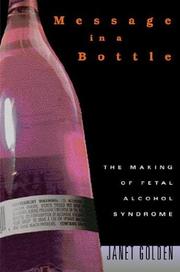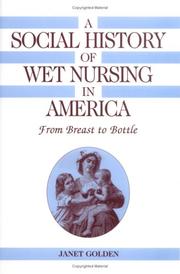| Listing 1 - 10 of 14 | << page >> |
Sort by
|
Book
ISBN: 1108244424 1108227309 1108246133 1108415008 Year: 2018 Publisher: Cambridge : Cambridge University Press,
Abstract | Keywords | Export | Availability | Bookmark
 Loading...
Loading...Choose an application
- Reference Manager
- EndNote
- RefWorks (Direct export to RefWorks)
Placing babies' lives at the center of her narrative, historian Janet Golden analyzes the dramatic transformations in the lives of American babies during the twentieth century. She examines how babies shaped American society and culture and led their families into the modern world to become more accepting of scientific medicine, active consumers, open to new theories of human psychological development, and welcoming of government advice and programs. Importantly Golden also connects the reduction in infant mortality to the increasing privatization of American lives. She also examines the influence of cultural traditions and religious practices upon the diversity of infant lives, exploring the ways class, race, region, gender, and community shaped life in the nursery and household.
Child rearing --- Infants --- Maternal and infant welfare --- Parent and infant --- Infant and parent --- Infant psychology --- Parent and child --- Infant welfare --- Maternity welfare --- Child welfare --- Mothers --- Women --- Maternal health services --- Babies --- Infancy --- Children --- Child raising --- Raising of children --- Rearing of children --- Training of children --- Child care --- History --- Charities, protection, etc. --- Charities --- Development and guidance --- Management --- Training --- United States

ISBN: 0674014855 Year: 2005 Publisher: Cambridge Harvard university press
Abstract | Keywords | Export | Availability | Bookmark
 Loading...
Loading...Choose an application
- Reference Manager
- EndNote
- RefWorks (Direct export to RefWorks)
The course of Fetal Alcohol Syndrome through the courts, the media, the medical establishment, and the public imagination is charted in a detailed study of the real-life impact of alcohol consumption for pregnant women and their children.
Alcoholism in pregnancy --- Fetal alcohol syndrome --- Complications
Book
ISBN: 9780674037717 Year: 2006 Publisher: Cambridge, MA
Abstract | Keywords | Export | Availability | Bookmark
 Loading...
Loading...Choose an application
- Reference Manager
- EndNote
- RefWorks (Direct export to RefWorks)
Multi
ISBN: 9781108227308 9781108415002 9781108400077 Year: 2018 Publisher: Cambridge Cambridge University Press
Abstract | Keywords | Export | Availability | Bookmark
 Loading...
Loading...Choose an application
- Reference Manager
- EndNote
- RefWorks (Direct export to RefWorks)

ISBN: 052149544X 0511572921 Year: 1996 Publisher: Cambridge : Cambridge University Press,
Abstract | Keywords | Export | Availability | Bookmark
 Loading...
Loading...Choose an application
- Reference Manager
- EndNote
- RefWorks (Direct export to RefWorks)
A Social History of Wet Nursing in the United States: From Breast to Bottle examines the intersection of medical science, social theory and cultural practices as they shaped relations among wet nurses, physicians and families from the colonial period through the twentieth century. It explores how Americans used wet nursing to solve infant feeding problems, shows why wet nursing became controversial as motherhood slowly became medicalised, and elaborates how the development of scientific infant feeding eliminated wet nursing by the beginning of the twentieth century. Janet Golden's study contributes to our understanding of the cultural authority of medical science, the role of physicians in shaping child rearing practices, the social construction of motherhood, and the profound dilemmas of class and culture that played out in the private space of the nursery.
Breastfeeding --- Infants --- Motherhood --- Physician and patient --- Wet-nurses --- Child care workers --- Doctor and patient --- Doctor-patient relationships --- Patient and doctor --- Patient and physician --- Patient-doctor relationships --- Patient-physician relationships --- Patients and doctors --- Patients and physicians --- Physician-patient relationships --- Physicians and patients --- Interpersonal relations --- Fear of doctors --- Narrative medicine --- Maternity --- Mothers --- Parenthood --- Babies --- Infancy --- Children --- Breast feeding --- Nursing (Breastfeeding) --- Suckling --- Lactation --- Wet nurses --- History --- Nutrition&delete& --- Nutrition --- Arts and Humanities --- History.
Book
ISBN: 0674037715 Year: 2005 Publisher: Cambridge, MA : Harvard University Press,
Abstract | Keywords | Export | Availability | Bookmark
 Loading...
Loading...Choose an application
- Reference Manager
- EndNote
- RefWorks (Direct export to RefWorks)
A generation has passed since a physician first noticed that women who drank heavily while pregnant gave birth to underweight infants with disturbing tell-tale characteristics. Women whose own mothers enjoyed martinis while pregnant now lost sleep over a bowl of rum raisin ice cream. In Message in a Bottle, Janet Golden charts the course of Fetal Alcohol Syndrome (FAS) through the courts, media, medical establishment, and public imagination. Long considered harmless during pregnancy (doctors even administered it intravenously during labor), alcohol, when consumed by pregnant women, increasingly appeared to be a potent teratogen and a pressing public health concern. Some clinicians recommended that women simply moderate alcohol consumption; others, however, claimed that there was no demonstrably safe level for a developing fetus, and called for complete abstinence. Even as the diagnosis gained acceptance and labels appeared on alcoholic beverages warning pregnant women of the danger, FAS began to be de-medicalized in some settings. More and more, FAS emerged in court cases as a viable defense for people charged with serious, even capital, crimes and their claims were rejected. Golden argues that the reaction to FAS was shaped by the struggle over women's relatively new abortion rights and the escalating media frenzy over "crack" babies. It was increasingly used as evidence of the moral decay found within marginalized communities--from inner-city neighborhoods to Indian reservations. With each reframing, FAS became a currency traded by politicians and political commentators, lawyers, public health professionals, and advocates for underrepresented minorities, each pursuing separate aims.
Fetal alcohol spectrum disorders. --- Alcoholism in pregnancy --- Complications.
Book
ISBN: 9780511572920 9780521495448 Year: 1996 Publisher: Cambridge Cambridge University Press
Abstract | Keywords | Export | Availability | Bookmark
 Loading...
Loading...Choose an application
- Reference Manager
- EndNote
- RefWorks (Direct export to RefWorks)
Book
ISBN: 9781512816303 Year: 1991 Publisher: Philadelphia
Abstract | Keywords | Export | Availability | Bookmark
 Loading...
Loading...Choose an application
- Reference Manager
- EndNote
- RefWorks (Direct export to RefWorks)

ISBN: 0813517575 0813517567 9780813517575 9780813517568 Year: 1997 Publisher: New Brunswick Rutgers university press
Abstract | Keywords | Export | Availability | Bookmark
 Loading...
Loading...Choose an application
- Reference Manager
- EndNote
- RefWorks (Direct export to RefWorks)
Medicine --- Social medicine --- Medical care --- Medical sociology --- Medicine, Social --- Public health --- Public welfare --- Sociology --- Medical ethics --- Medical sociologists --- History --- Social aspects --- Health Workforce --- Medicine - History
Book
ISBN: 0813591511 0813591473 0813591481 0813591503 Year: 2020 Publisher: New Brunswick Rutgers University Press
Abstract | Keywords | Export | Availability | Bookmark
 Loading...
Loading...Choose an application
- Reference Manager
- EndNote
- RefWorks (Direct export to RefWorks)
Pyrrhic Progress analyses over half a century of antibiotic use, regulation, and resistance in US and British food production. Mass-introduced after 1945, antibiotics helped revolutionize post-war agriculture. Food producers used antibiotics to prevent and treat disease, protect plants, preserve food, and promote animals' growth. Many soon became dependent on routine antibiotic use to sustain and increase production. The resulting growth of antibiotic infrastructures came at a price. Critics blamed antibiotics for leaving dangerous residues in food, enabling bad animal welfare, and selecting for antimicrobial resistance (AMR) in bacteria, which could no longer be treated with antibiotics. Pyrrhic Progress reconstructs the complicated negotiations that accompanied this process of risk prioritization between consumers, farmers, and regulators on both sides of the Atlantic. Unsurprisingly, solutions differed: while Europeans implemented precautionary antibiotic restrictions to curb AMR, consumer concerns and cost-benefit assessments made US regulators focus on curbing drug residues in food. The result was a growing divergence of antibiotic stewardship and a rise of AMR. Kirchhelle's comprehensive analysis of evolving non-human antibiotic use and the historical complexities of antibiotic stewardship provides important insights for current debates on the global burden of AMR.
History --- Medicine --- History, 21st Century --- History, 20th Century --- Agriculture --- Legislation, Drug --- Food Safety --- Drug Resistance, Microbial --- Anti-Bacterial Agents --- history --- United States --- United Kingdom --- Anti-bacterial agents --- Antibacterials --- Bacteriocidal agents --- Bacteriostatic agents --- Anti-infective agents --- Bacterial diseases --- Bactericides --- Chemotherapy --- Storbritannien --- Anglia --- Wielka Brytania --- Nagy-Britannia --- United Kingdom of Great Britain and Ireland --- United Kingdom of Great Britain and Northern Ireland --- Grande-Bretagne --- Angliyah --- Briṭanyah --- Velikobritanii︠a︡ --- Saharātchaʻānāčhak --- Marea Britanie --- Grossbritannien --- Prydain Fawr --- Royaume-Uni --- Iso-Britannia --- Yhdistynyt kuningaskunta --- Förenade kungariket --- Grã-Bretanha --- בריטניה --- イギリス --- Igirisu --- Northern Ireland --- Scotland --- Wales --- England and Wales --- ABŞ --- ABSh --- Ameerika Ühendriigid --- America (Republic) --- Amerika Birlăshmish Shtatlary --- Amerika Birlăşmi Ştatları --- Amerika Birlăşmiş Ştatları --- Amerika ka Kelenyalen Jamanaw --- Amerika Qūrama Shtattary --- Amerika Qŭshma Shtatlari --- Amerika Qushma Shtattary --- Amerika (Republic) --- Amerikai Egyesült Államok --- Amerikanʹ Veĭtʹsėndi︠a︡vks Shtattnė --- Amerikări Pĕrleshu̇llĕ Shtatsem --- Amerikas Forenede Stater --- Amerikayi Miatsʻyal Nahangner --- Ameriketako Estatu Batuak --- Amirika Carékat --- AQSh --- Ar. ha-B. --- Arhab --- Artsot ha-Berit --- Artzois Ha'bris --- Bí-kok --- Ē.P.A. --- EE.UU. --- Egyesült Államok --- ĒPA --- Estados Unidos --- Estados Unidos da América do Norte --- Estados Unidos de América --- Estaos Xuníos --- Estaos Xuníos d'América --- Estatos Unitos --- Estatos Unitos d'America --- Estats Units d'Amèrica --- Ètats-Unis d'Amèrica --- États-Unis d'Amérique --- Fareyniḳṭe Shṭaṭn --- Feriene Steaten --- Feriene Steaten fan Amearika --- Forente stater --- FS --- Hēnomenai Politeiai Amerikēs --- Hēnōmenes Politeies tēs Amerikēs --- Hiwsisayin Amerikayi Miatsʻeal Tērutʻiwnkʻ --- Istadus Unidus --- Jungtinės Amerikos valstybės --- Mei guo --- Mei-kuo --- Meiguo --- Mî-koet --- Miatsʻyal Nahangner --- Miguk --- Na Stàitean Aonaichte --- NSA --- S.U.A. --- SAD --- Saharat ʻAmērikā --- SASht --- Severo-Amerikanskie Shtaty --- Severo-Amerikanskie Soedinennye Shtaty --- Si︠e︡vero-Amerikanskīe Soedinennye Shtaty --- Sjedinjene Američke Države --- Soedinennye Shtaty Ameriki --- Soedinennye Shtaty Severnoĭ Ameriki --- Soedinennye Shtaty Si︠e︡vernoĭ Ameriki --- Spojené obce severoamerické --- Spojené staty americké --- SShA --- Stadoù-Unanet Amerika --- Stáit Aontaithe Mheiriceá --- Stany Zjednoczone --- Stati Uniti --- Stati Uniti d'America --- Stâts Unîts --- Stâts Unîts di Americhe --- Steatyn Unnaneysit --- Steatyn Unnaneysit America --- SUA (Stati Uniti d'America) --- Sŭedineni amerikanski shtati --- Sŭedinenite shtati --- Tetã peteĩ reko Amérikagua --- U.S. --- U.S.A. --- United States of America --- Unol Daleithiau --- Unol Daleithiau America --- Unuiĝintaj Ŝtatoj de Ameriko --- US --- USA --- Usono --- Vaeinigte Staatn --- Vaeinigte Staatn vo Amerika --- Vereinigte Staaten --- Vereinigte Staaten von Amerika --- Verenigde State van Amerika --- Verenigde Staten --- VS --- VSA --- Wááshindoon Bikéyah Ałhidadiidzooígíí --- Wilāyāt al-Muttaḥidah --- Wilāyāt al-Muttaḥidah al-Amirīkīyah --- Wilāyāt al-Muttaḥidah al-Amrīkīyah --- Yhdysvallat --- Yunaeted Stet --- Yunaeted Stet blong Amerika --- ZDA --- Združene države Amerike --- Zʹi︠e︡dnani Derz︠h︡avy Ameryky --- Zjadnośone staty Ameriki --- Zluchanyi︠a︡ Shtaty Ameryki --- Zlucheni Derz︠h︡avy --- ZSA --- Η.Π.Α. --- Ηνωμένες Πολιτείες της Αμερικής --- Америка (Republic) --- Американь Вейтьсэндявкс Штаттнэ --- Америкӑри Пӗрлешӳллӗ Штатсем --- САЩ --- Съединените щати --- Злучаныя Штаты Амерыкі --- ولايات المتحدة --- ولايات المتّحدة الأمريكيّة --- ولايات المتحدة الامريكية --- 미국 --- Drug legalization --- Food --- Drug resistance in microorganisms --- History. --- history. --- Safety measures. --- Genetic aspects. --- Microbial genetics --- Decriminalization of illegal drugs --- Drug decriminalization --- Legalization of illegal drugs --- Decriminalization --- Narcotic laws --- Health, medicine, antibiotics, history of antibiotics, Anglo-American food production, post-war agriculture, food production, agriculture, antibiotic use, antibiotic regulation, British food production, antibiotic resistance, twentieth century, US food production, United States, antibiotic infrastructure, animal welfare, antimicrobial resistance, farming, farmers, AMR, agricultural history, environmental history, public health, risk management. --- États-Unis --- É.-U. --- ÉU --- Briṭena
| Listing 1 - 10 of 14 | << page >> |
Sort by
|

 Search
Search Feedback
Feedback About UniCat
About UniCat  Help
Help News
News